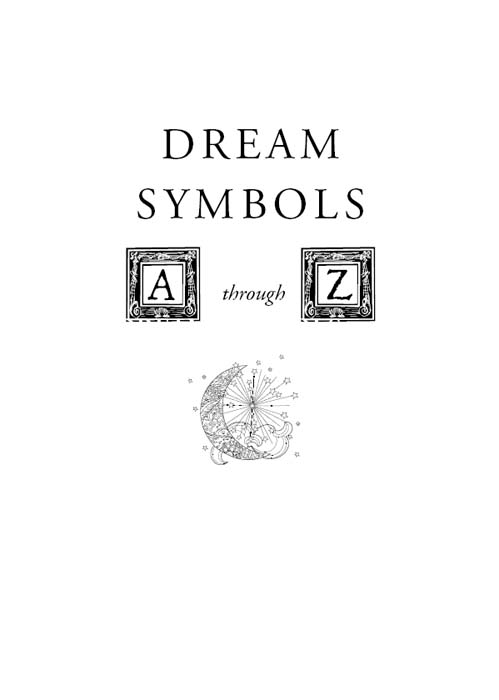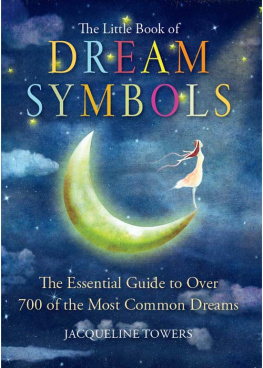

Copyright 2005, 2017
by Jacqueline Towers
All rights reserved. No part of this publication may be reproduced or transmitted in any form or by any means, electronic or mechanical, including photocopying, recording, or by any information storage and retrieval system, without permission in writing from Hampton Roads Publishing, Inc. Reviewers may quote brief passages.
Previously published in 2005 as Simply Dreams
by Zambezi Publishing Limited, Devon, UK.
Cover design by Jim Warner
Cover illustration Natalia Moroz / istock
Interior design by Kathryn Sky-Peck
Hampton Roads Publishing Company, Inc.
Charlottesville, VA 22906
Distributed by Red Wheel/Weiser, LLC
www.redwheelweiser.com
Sign up for our newsletter and special offers by going to
www.redwheelweiser.com/newsletter/
ISBN: 978-1-57174-758-7
Library of Congress Control Number: 2016956361
Printed in the United States of America
M&G
10 9 8 7 6 5 4 3 2 1
www.redwheelweiser.com
www.redwheelweiser.com/newsletter
Contents

An Introduction to Dreams
 t is probable that people have discussed their dreams from the dawn of history. Certainly the Bible and other early texts contain stories about important or prophetic dreams, with the most famous being Joseph's dreams of a famine in Egypt and Jacob's dream of a ladder leading to heaven. Every race and culture in the world tells stories about dreams, and dream books are not confined to the Western world. Such books have existed for centuries in the Middle and Far East, and especially in Iran, where dreams are considered important indicators of future events.
t is probable that people have discussed their dreams from the dawn of history. Certainly the Bible and other early texts contain stories about important or prophetic dreams, with the most famous being Joseph's dreams of a famine in Egypt and Jacob's dream of a ladder leading to heaven. Every race and culture in the world tells stories about dreams, and dream books are not confined to the Western world. Such books have existed for centuries in the Middle and Far East, and especially in Iran, where dreams are considered important indicators of future events.
Lucid dreaming means choosing the dream you want to have and concentrating on it before falling asleep. The purpose is to allow your mind to work on the subject contained in the dream and maybe even transmit it to another person. If you can do this, the dream will take place not soon after falling asleep but an hour or two before waking. Some people can do this; others cannot.
Eugene Aserinsky and Nathaniel Kleitman discovered REM (rapid eye movement) sleep in 1953. Their research has shown us that dreams occur during set ninety-minute periods when the eyes appear to move about and muscles twitch and move. Those who swear that they never dream just do not remember their dreams. Fortunately, most people do remember some of their dreams.
Sigmund Freud and Carl Gustav Jung are the founders of modern psychoanalysis and are the first medical men to take dreams seriously, concluding that they tell a lot about the state of a patient's mind. Jung suggested to his patients that if they surface during the night with a vivid dream in mind, they should write it down right away, because it is difficult to recall the dream later.
Today, there are conflicting arguments about the importance of dreams, because some people consider that every dream you remember tells you something about your state of mind. Some people believe that dreams are prophetic, and yet other people consider that dreams are nothing more than the mind's way of clearing space for the new information that will shortly be coming its way. In my experience as a psychic counselor and medium, I believe all these things. Some dreams do seem to be a way of clearing space in the mind, while others show how we feel at any point in time, but there are definitely also prophetic dreams.
Sometimes a relative who has died will visit a sleeping person and bring a message. It is often easier for this person to get through to a loved one in this way, so any messages of this type can contain useful advice or a warning. Some dreams foretell the future by showing the dreamer exactly what is due to happen, but most do so symbolically. The human mind resonates with certain symbols, and a book like this will help you to discover what these symbols mean. Sometimes two people have an almost identical dream; such dreams are usually prophetic.
The rather weird idea of opposite or contrary dreams is an old one. These are dreams that seem to predict good events but actually predict bad ones, and vice versa. So now, use this dream dictionary to untangle the meaning behind your dreams, and then use the advice or warning that dreams bring you to your advantage.
As you begin interpreting your dreams, consider the images that the dreams are giving you. Consider sayings such as Go with the flow, Where there's smoke, there's fire, You can't see the forest for the trees, It never rains, but it pours, and so on. If a certain image means something to you, check the interpretation in this book, but also go with your own feeling about the image. For instance, a wheel could indicate travel to one person, the passage of time to another, and a roulette wheel and the wheel of fortune to someone else.
Nightmares
Nightmares can be nature's way of allowing us to express thoughts and feelings that we either push away during the day or that are bothering us more than we realize. Some nightmares are of the chasing variety, in which we cannot reach our destination, while others are of chasing after something that is getting away from us. Both these types of dreams show us that our lives are overloaded with stress and responsibilities.
Sometimes nightmares are the mind's way of coping with severe trauma after a frightening experience or after a period of severe danger. A friend of mine had nightmares every night for about six weeks after being in a car accident. Also, those who survive war situations may especially be beset by occasional nightmares for the rest of their lives. In fact, the word trauma comes from the German, traum, which means dream.
Many times nightmares intrude into our waking lives and disturb us, which means that they are alerting us to somethinggood or badto come. Alternatively, a nightmare may be a form of warning that can alert you to a problem in your normal waking life, especially if it is a recurring nightmare. For instance, a friend of mine kept having dreams about choking, which she interpreted as a message that she should quit smoking. She stopped smoking and the nightmares quickly stopped. In this case, her body was sending her messages via her subconscious.
Here is another strange story. A friend of mine used to dream about crossing a rope bridge, similar to the ones you see in adventure films that span a gorge with a fast-flowing river below. In the dream, my friend was a primitive native person. She crossed the swaying bridge while holding her small daughter by the hand. The daughter lost her footing and slipped off the bridge, but my friend managed to haul her back by hand. They both survived the crossing, but her daughter's arm was broken. The odd thing is that her daughter used to have the same recurring dream, except that she was the child holding on to her mother's hand in the dream. While my friend's daughter was playing on a swing set in a neighbor's garden one day, she fell and broke her arm badly. Was this dream a reference to a previous life? Was it a warning to the child not to climb? Was it just a strange coincidence? We'll never know.

Next page








 t is probable that people have discussed their dreams from the dawn of history. Certainly the Bible and other early texts contain stories about important or prophetic dreams, with the most famous being Joseph's dreams of a famine in Egypt and Jacob's dream of a ladder leading to heaven. Every race and culture in the world tells stories about dreams, and dream books are not confined to the Western world. Such books have existed for centuries in the Middle and Far East, and especially in Iran, where dreams are considered important indicators of future events.
t is probable that people have discussed their dreams from the dawn of history. Certainly the Bible and other early texts contain stories about important or prophetic dreams, with the most famous being Joseph's dreams of a famine in Egypt and Jacob's dream of a ladder leading to heaven. Every race and culture in the world tells stories about dreams, and dream books are not confined to the Western world. Such books have existed for centuries in the Middle and Far East, and especially in Iran, where dreams are considered important indicators of future events.